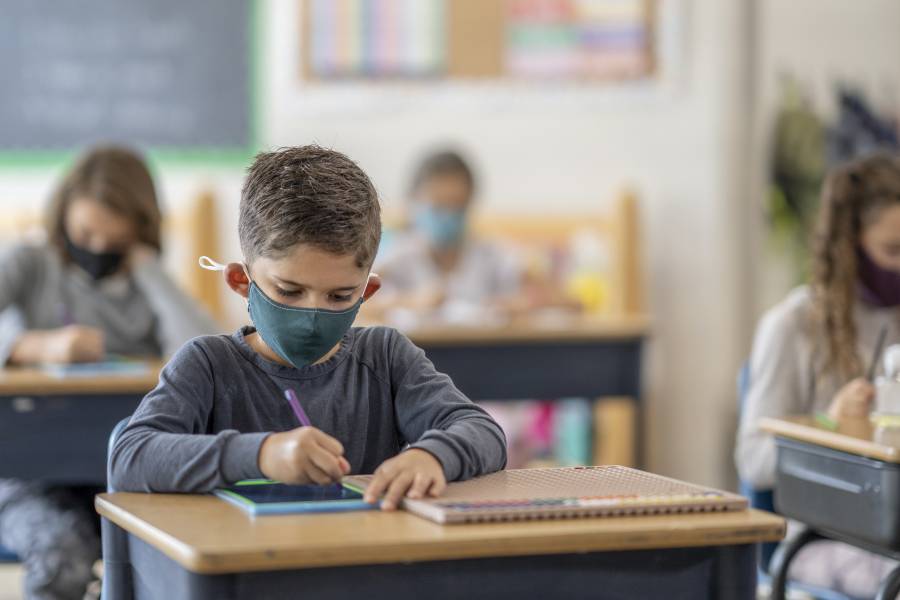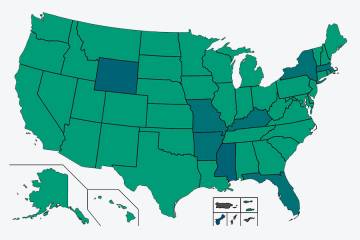In an analysis of all 50 states' policies about masking in schools, requiring COVID-19 vaccines for eligible students and teachers, and providing COVID-19 services in the school setting, Johns Hopkins University researchers have found widespread discordance and variation not only between states but also within states themselves as individual districts adopt policies at odds with their own governors' guidelines.
"The COVID-19 virus doesn't care about school district or state lines," said Megan Collins, a bioethicist and associate professor of medicine at the Wilmer Eye Institute who co-directs the Johns Hopkins Consortium for School-Based Health Solutions. "The current uncoordinated approach has us in a third year of schooling impacted by coronavirus and we're rapidly closing in on a fourth. Our goal is to provide useful, reliable information for education and public health policy stakeholders and researchers, teachers, school staff, and parents from across the country—anyone working on or thinking about kids going back to school and staying there."
The analysis utilizes information from a new online tracker launched by the Johns Hopkins eSchool+ Initiative that examines state policies about masking in schools, COVID-19 vaccines for eligible students and teachers, and COVID-19 services offered in the school setting in all 50 states, the District of Columbia, the Bureau of Indian Education, and major U.S. territories. The tracker also includes details from 56 index school districts selected from 20 states, representing the lowest and highest poverty, as well as the largest school district in each state.
Currently, the tracker lists North Dakota as the only state that prohibits individual districts from requiring masks in school. Similar mask mandate bans in Florida, Oklahoma are on hold, awaiting the outcome of lawsuits seeking to overturn them. South Dakota and Oklahoma prohibit a vaccine mandate. But the JHU researchers found marked variations at the district level, identifying 46 instances where district policies for masking or vaccination did not align with their state's policy.
"The disconnect between state and district policy can create issues of trust for parents and teachers, as they are being told one thing by the state, and often something entirely different by their school district," said Collins. The tracker also includes information about school-based testing and vaccination availability, and if virtual/hybrid learning options are offered for students based on the state or district mask or vaccination policies.
"While all children have suffered from in this pandemic, disadvantaged children have suffered the most," said Ruth Faden, founder of the Johns Hopkins Berman Institute of Bioethics. "However, on mask and vaccine policies, the biggest differences seem to vary by size of school district, rather than poverty or affluence. We found that the largest districts are requiring masks and teacher vaccination at much higher levels than smaller districts, regardless of poverty level."
The study also found that, as with other pandemic policies, the governor matters. While 65% of states with Democratic governors require teacher and student masking, only 10% of states with Republican governors do. Similarly, 35% of states with Democratic governors require teacher COVID-19 vaccination; 3% of states with Republican governors do.
"The team's work is designed to bring attention to the accumulating body of data about school COVID-19 policies, and to examine which policies risk to worsen existing inequities in access to educational resources," said Annette Campbell Anderson, deputy director of the Johns Hopkins Center for Safe & Healthy Schools and a professor in the School of Education. "We want to share the pulse of what's happening across the country as policymakers analyze the landscape for 2022 and think about appropriate actions."
The tracker will be updated on a weekly basis. The Johns Hopkins eSchool+ Initiative was established in the early months of the COVID-19 pandemic as an interdisciplinary effort to develop guidance for schools and policy stakeholders to think responsibly and equitably about students during school closures and reopening. The Initiative includes broad representation from the Johns Hopkins Schools of Education, Public Health and Medicine, the Berman Institute of Bioethics, and the Center for Civic Impact, bringing together expertise in ethics, equity and structural injustice, education, school-based health care, food security, and public health policy.









